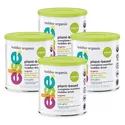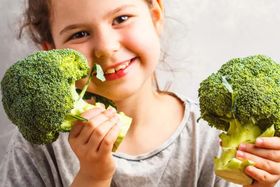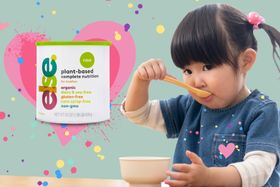Choosing the Best Dairy Alternatives for Kids: A Guide to Nutritional Value and Options
Updated November 18, 2024

Historically, the primary beverage of children has been cow’s milk. These days, however, a stroll down your local dairy aisle reveals a wide display of milk alternatives such as almond milk, soy milk, oat milk, hemp milk, cashew milk, coconut milk and more. The soy milk and rice milk options, previously relegated to a single shelf, now have their own refrigerated section of non-dairy milk, along with nut-based, hemp, oat, and pea milks. Each non-dairy product comes with its own claims of nutritional benefit. With so many options available, how does a parent choose the best cow's milk alternative or dairy-free milk option?
Alternative milk products have become increasingly popular among both parents and their children. Among families in my practice, more choose milk alternatives such as nut milk or plant milk, even in the absence of a cow’s milk protein allergy. Some grade school-aged children and adolescents claim to “dislike the taste” of cow’s milk, and prefer a dairy-free milk substitute. Those who have acne are often told by their dermatologists to avoid dairy and choose a plant-based milk alternative as a preventative measure. In other cases, parents are concerned about the limited number of foods that their child agrees to eat, and believe that offering a “milk” that is fortified with vitamins can replace missing nutrients. Unfortunately, these alternative milk products are sold and promoted without much discussion of their true nutritional value as a milk substitute. Many are not as healthy as they appear.
What Exactly Is Pea Milk?
Pea protein has become an increasingly used ingredient in plant-based milk products and kids nutritional supplements. The protein comes from ground yellow spit peas. Although high in dietary fiber, peas are not a complete source of protein (source). Pea milks can provide some iron, calcium, and a few minerals, but they are deficient in other essential vitamins. Also, to improve the taste, the second or third ingredient on the nutrition label of the products often some form of added sugar.
How Healthy Is Oat Milk?
Most oat milk formulations are produced by soaking oats in water, and then pressing out the “milky” liquid. Oats are gluten, dairy, and soy-free, but they are rather low in protein, similar to rice milk. Oat protein is also more difficult to digest due to alterations that occur during processing (source). Because few vitamins naturally occur in oats, fortification is necessary to increase the nutritional value of oat milks. Although unsweetened versions can be purchased, many manufacturers add sugar to make the final product more palatable. While oat milks are popular as a non-dairy milk alternative, they are probably best reserved for use in parents’ cappuccinos and lattes.
The Problem of Almond, Coconut, And Other Nut-based Milks
There are many types of nut based milks such as macadamia nut milk, coconut milk, cashew milk, and hazelnut milk. In their raw forms, nuts are a nutrient dense food that can be a good source of protein, healthy fats, and some fat-soluble vitamins (source). Unfortunately, most nut milks are processed in a way that the final product is quite low in protein. Although fortified with calcium and other vitamins, not all contain the vitamin D that is important for bone health and immunity. Aside from unsweetened almond milk versions, the added sugar content of these products is concerning when compared to a dairy product like cow milk.
Else: A More Nutritionally Complete Option
Fortunately, there is a great-tasting, low-sugar dairy alternative that is more nutritious: Else. This innovative kids nutritional beverage can be consumed alone as a glass of “milk” or used to prepare foods such as pancakes, smoothies, and other recipes. Unlike competitor plant-based milks, Else contains protein from almond butter and buckwheat, along with a variety of vitamins and minerals. What stands above the competition, however, is its low sugar content. This does not mean that taste is compromised. Else is available in kid-friendly chocolate and vanilla flavors. With all of these benefits, why would parents choose anything Else?
The content and advice provided in this article is for informational purposes only and is not a substitute for medical diagnosis, treatment, advice for specific medical conditions. Always consult a pediatrician to understand the individual needs of your child.












